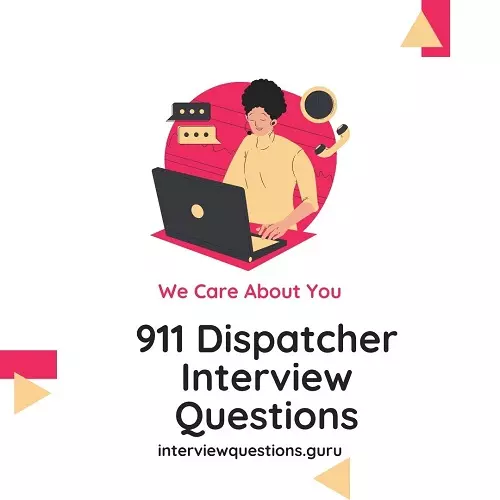If you’re looking for a job as a 911 dispatcher, it’s essential to know the interview process. That way, you can prepare ahead of time and ensure that you’ll get the job! This blog post discusses some of the typical 911 dispatcher interview questions asked in interviews for this position. You’ll learn why answering these questions is crucial if you want to succeed and get the job.
Before we begin, though, there are two essential things to note:
1) These questions are based on an average interview process – not all potential employers may ask all of them.
2) The best thing anyone can do before applying for any job is research- so if there’s anything specific about your city or state that needs clarification.
Table of Contents
911 Dispatcher Interview Questions and Answers
Why would you want to be a dispatcher?
There are many reasons someone wants to become a dispatcher, so it’s essential to tailor your answer accordingly. Some good responses could be that you want to help people in their time of need or looking for an opportunity to make a difference in your community.
Example Answer: I’ve always had an interest in emergency services, and this is a great way to help people.
How do you deal with a stressful situation?
Dispatchers often have to deal with high-stress situations, so the interviewer wants to know how you’ll handle this type of environment. It’s essential to be honest, and let them know that you sometimes need time to de-escalate but are ultimately capable of handling stressful situations.
Example Answer: I usually take a few minutes to myself when things get stressful, but I can always find my composure and move forward.
What would you do if someone was yelling or being aggressive?
Being firm and assertive is essential in this role, so the interviewer wants to know how well you’ll be able to handle these situations. It’s also important to stay calm and not escalate the situation.
Example Answer: I would try to de-escalate the situation as much as possible, and if that doesn’t work, I will contact another dispatcher for help.
What’s your experience with computers?
Most 911 dispatcher roles require some computer knowledge, so the interviewer will want to know if you have experience in this area. It’s also important not to be nervous or uncomfortable with computers – stay calm and answer confidently!
Example Answer: I’ve always loved using technology, so I’m comfortable working on a computer when it comes to the job.
What kind of training have you had taking calls?
Most 911 dispatcher roles require training, so the interviewer wants to know if you have any experience in this area. They may also ask about your ability to listen and take notes.
Example Answer: I’m not familiar with this job’s specifics, but I’m willing to learn more and take on some extra training if needed.
What are the most challenging aspects of this job?
The interviewer wants to know how you’ll handle challenging situations, so it’s crucial to be able – but not too eager- to discuss your biggest challenges. It’s also vital that you show that you can take on these challenges.
Example Answer: I think the most challenging thing will be dealing with different types of people and their emotions, but I’m confident that I can handle it.
What are the opportunities for advancement in this job?
It’s essential to show that you have a long-term interest and some short-term goals of where you’d like to be within the next three years.
Example Answer: I’m looking for an opportunity to grow and learn more about my strengths and weaknesses – what are your future goals for this role?
Should an officer ever break the law to enforce it?
It is a general question designed to see if you have solid and well-informed opinions. It’s important not to say something offensive and be confident in your answer!
Example Answer: No, the law should consistently be enforced – even if it means going against an officer who breaks it.
Where would you like to be as a dispatcher five years from now?
This question is designed to see if you have goals and a long-term plan for your career. It’s important not to say something like ‘in the same position’ or ‘I’m happy where I am. You should come across as ambitious but also realistic!
Answer: In five years, I hope we are in a position where I’ve learned more about computer systems and how they work. Additionally, I would like to be supervising other dispatchers and help them manage difficult calls.
What is your experience with customer service?
Suppose you have any practical experience that would make you a good dispatcher. It’s important to talk about any customer service experience you’ve had, whether in a retail setting or another job.
Example Answer: I’ve had plenty of customer service experience, most notably in my previous role as a cashier. I understand how to deal with demanding customers and remain calm under pressure.
Must Read
30+ Customer Service Interview Questions and Answers
What would you do if a caller refused to give their name?
It’s important to have a plan for this type of situation. The interviewer wants to know how you would handle it if the caller refused to identify themselves. Stay calm and assertive!
Example Answer: I would try to get as much information from them as possible and then contact another dispatcher for help. I wouldn’t be able to do anything without their name.
Can you describe your ideal work environment and why?
The interviewer wants to see if you would be a good fit. They want to know what kind of environment you work best in and why you think this position would be a good match. It’s important not to say something like ‘outdoors’ or ‘alone,’ be more specific than that!
Example Answer: I thrive in an organized and structured environment where I can stay calm under pressure. I think my ideal work environment would be quiet, where we can focus. I also think it’s essential for me to be able to work with people who are reliable and good at what they do – everyone needs a hand sometimes!
What would you say is your greatest strength?
The interviewer wants to know what you think your best qualities are. It’s important not to say something like ‘I work hard’ or ‘I care about my job.’ Be specific!
Example Answer: My greatest strength is my ability to stay calm under pressure. I’ve had experience dealing with demanding customers and situations, and I know how to handle them without getting flustered. I can take a step back and think logically to develop a solution. Additionally, I’m very patient, which is essential for this job.
When were some times when you were in a leadership role?
The interviewer wants to know what your experience in a leadership role is. It’s important to talk about any leadership experience you’ve had, whether it was in a retail setting or another job.
Example Answer: I’ve been a leader in the past when I was on the student council. I understand how to take charge and motivate people when needed. Additionally, I’ve been a leader in my previous job, where I supervised other employees.
What do you think are the essential qualities for a dispatcher?
The interviewer wants to know what you think are the most important qualities for a dispatcher. It’s important to say something like ‘communication skills’ or ’empathy.’ Be specific!
Example Answer: I think the essential qualities are communication skills and empathy. A dispatcher needs to communicate with callers effectively and understand their situation.
They also need to put themselves in the caller’s shoes and understand their feelings. Additionally, it’s important to have good problem-solving skills to handle difficult calls.
What are some times when you had to deal with an upset or angry customer, and how did you handle the situation?
It’s important not to get defensive or angry. Stay calm and assertive!
Answer: In the past, I’ve had a few customers who have been rude or upset, and I stay calm and always remember the Golden Rule – treat others how you would like to be treated!
How would you describe your character and personality traits?
The interviewer wants to know what your personality is like. They want to see how you would fit in with the department and if you enjoy working here.
Example Answer: I think I’m energetic, resourceful, and hardworking – three qualities that I believe are essential for this position! Additionally, I am reliable and detail-oriented, which is important in this field. Lastly, I have a good sense of humor which helps me de-stress and stay positive in difficult situations.
Are you comfortable working alone?
The interviewer wants to know if you are introverted or extroverted. They want to see how well you would work in this environment and whether you can handle working on your own.
Example Answer: I am comfortable working alone. I worked the overnight shift in my previous job, and I was okay with it. Sometimes, dispatchers have to work odd hours, so I’m prepared.
Are you comfortable working shifts?
The interviewer wants to know if you can handle odd working hours and may not be the traditional ‘nine to five.’
Example Answer: I am comfortable working shifts. I worked the overnight shift in my previous job, and I was okay with it. Sometimes, dispatchers have to work odd hours, so I’m prepared.
Other 911 Dispatcher Interview Questions
- How would your friends describe you as a person?
- Describe your ideal job. How does this position compare to that one?
- When was the last time you called 911, and why?
- Why should we hire someone like you?
- Do you have any questions for us?
911 Dispatcher Interview Tips
-Be aware of the specific job requirements and make sure you can speak to each of them.
-Come up with examples that illustrate how you meet the qualifications listed in the ad.
-Have a solid understanding of what a dispatcher does on a day-to-day basis. It will help you answer questions about why you want to be a dispatcher.
-Display qualities such as patience, empathy, and good communication skills. These are essential for the job.
-Be aware of your body language and make sure you’re coming across as confident and poised.
What to wear to a 911 dispatcher interview?
Generally, it is best to dress professionally for any job interview. It shows the interviewer that you are serious about the position and takes your work seriously. For men, a suit or slacks and a shirt are ideal. A tie is not necessary but always looks sharp. For women, a skirt or pantsuit is perfect.
for more 911.gov
Final Thoughts
Now that we’ve gone over some common 911 dispatcher interview questions, let’s look at the most crucial thing: how to prepare for an interview. The best way to go into any job interview is with confidence and a plan of action, so we’ll discuss that in our next blog post!

